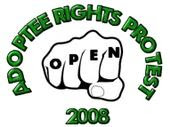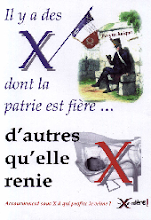 ALBANY TIMES-UNION
ALBANY TIMES-UNIONJanuary 13, 2008
Opening closed books on adoption
Adoptees urge reform of state laws designed for a different era
By JENNIFER GISH, Staff writer
Sharon Smith wonders if the stranger beside her in a crowd could be a cousin or a sibling.
And if baseball, a sport her three sons love to play but her husband does not, runs in your blood, does it course through her side of the family?
Smith says she had a wonderful childhood, raised in the Capital Region by a loving mother whom she gladly would have adopted if her mother hadn't adopted her first.
But there's a place in everyone where nurture gives way to nature. And that is the part of Smith's identity that New York has kept from her. New York, like many states, has sealed adoption and birth records, including adoptees' original birth certificates. That leaves them without access to their birth parents' identities, and basic information about their heritage and family medical history. Those missing answers send them to library archives and the Internet, searching with little more than a birth date.
"I just want to know her. Sometimes you feel like you're not connected, like you don't have any background," says Smith, a 43-year-old dental hygienist from Colonie who started her search for her birth mother in 2000. "I'm not going to replace my mother. It's the curiosity of me wanting to find out genetics. ... I'm an adult now. Why can't I know where I came from?"
Bills pending in both Assembly and Senate committees would grant adult adoptees access to their original birth certificates and medical information while offering birth parents the chance to indicate whether they wish to have contact with their offspring. Such bills have died in the past, but advocates such as bill sponsor Sen. Bill Larkin, R-Cornwall-on-Hudson, say that the recent opening of records in several states and changing attitudes toward adoption have buoyed the cause.
"I've had more people talk to me about this in the last six months than they ever did before," Larkin says. "If you look at some of the laws that we're trying to address, they were put into place back in the '30s and '40s, and nobody really knew what was going on. The question in those days was to protect the person from being labeled illegitimate. There are some basic fundamental rights where adoptees should be allowed to find out who their parents are."
Since 1996, six states -- Tennessee, New Hampshire, Maine, Delaware, Alabama and Oregon -- have opened birth records to adoptees. Records were never closed in Alaska and Kansas. Eleven other states have allowed adoptees born prior to the records closure or after the law to open records was passed to have access to their original birth certificates. And since last fall, Michigan, Missouri, Minnesota, North Carolina, Ohio and Texas also have introduced legislation to open records in some way, according to a recent report by the Evan B. Donaldson Adoption Institute, a national nonprofit organization aimed at improving adoption policy and practice.
Instead of open records, New York maintains what adoption experts call a "passive registry." Adoptees older than 18, biological siblings of adopted people and birth parents can register with the Adoption Information Registry, which is maintained by the state Department of Health.
Adult adoptees who register can request non-identifying information about their birth parent, which the state pulls from the adoptee's original birth certificate and agency records. Sometimes, it offers the parents' age, nationality, religion, education, occupation, and sometimes, it offers very little, like in Smith's case.
"Mine basically said she was 21, and that was it," Smith says.
Identifying information is also available, but only if the adoptee and then either the birth parent or a biological sibling have registered and a match is made. Medical information can be left by birth parents any time after the adoption, which will go to registered adoptees.
No matches have been made for Smith.
New York started its registry in 1984, and since then 21,768 adoptees have joined. In that same time frame, 5,270 birth parents have registered and 1,067 matches have been made.
Numbers like those illustrate why registries are not effective, says Adam Pertman, executive director of the Evan B. Donaldson Institute.
"You can't register if you die. People move in our society, a lot of people are born in one state and adopted into another. There are a lot of logistical issues, and not to mention most people don't know about them," Pertman says. "What they don't alleviate is the fairness issue. Unless there's some reason to think that adoptees, as a class, are a problem, then why treat them differently or in a lesser way than all other citizens of America?"
If she could get identifying information, Smith says she could at least know a little more about her heritage and medical history. She doesn't need a relationship, but would welcome one with her birth mother.
Smith has written letters and made phone calls to strangers who share what she believes to be her birth mother's last name. Friends have combed through library archives on their lunch breaks. Her husband paged through old high school yearbooks looking for a face that matched his wife's. And Smith has spent countless hours on the Internet engaged in her own search and reading the stories of other adoptees who share similar questions about their pasts.
In October, a year after her adopted mother lost her battle with cancer, Smith took out an ad in the Times Union's classified section. Listed under General Notices and sandwiched between ads for sociology study subjects and people to promote a new health drink, it read: "Adoptee searching for birth mother by name of Betty who worked at old Albany Public Market in Albany. Birth daughter's DOB is 6/22/64, born at Memorial Hospital." She had it run with a star graphic above the text and her e-mail address at the end.
She received sympathetic e-mails from mothers who'd given their children up for adoption and adult adoptees, but no leads.
Smith says she's fortunate to know more about her beginnings than most adoptees. A family friend said Smith's adoption was privately handled, brokered by a lawyer with assistance from family friends who knew someone who knew of a young woman who was pregnant and unsure of what to do. Within the last year, the family friend gave Smith her birth mother's full name, which Smith says she won't share publicly in case it would cause stress to her birth mother.
Smith's search is an emotional one, complicated by a sense of torn loyalties experienced by many adopted adults. Her adopted mother wasn't open to the idea of Smith's search and left Smith no details about her adoption when she died.
"I really had to push myself to register with New York state because I felt like I was doing something wrong," she says. "You kind of feel like you're sneaking."
Smith always felt she couldn't talk to her adopted mother about the desire to know something about her birth mother. Relatives told Smith that her adopted mother was on edge for the first year of Smith's life, afraid that the birth mother would want Smith back. It was a topic they didn't discuss, and for most of her life, Smith didn't care.
She learned she was adopted in seventh or eighth grade. The question of her own biological mother never bothered her. Smith didn't feel her absence at her wedding or think about it when she gave birth to her own sons. It was as if, one day, she just wanted to know.
But adoptees have not been able to know since New York sealed records in the mid-1930s, becoming one of the earliest states to do so, says Elizabeth J. Samuels, a professor of law at the University of Baltimore School of Law who has researched the history of records closure. Those who advocate for closed records argue that birth mothers were told their information would be kept secret. But Samuels says that was not the case, and that states actually began closing records to protect adoptive parents from possible interference by birth parents.
When Tennessee opened records in 1996, challenges followed, but the suits were rejected by the courts, who said open records do not violate the rights of birth parents.
Most birth parents want to know what happened to their children, says Sylvia Ackerson, founder of Sylvia's New York Adoption Page, one of the many Web sites where adoptees and parents can work on their search.
"When we placed our kids they say, 'Forget about it. Pretend it never happened. Go on with your life; you'll have other kids.' Basically, it's a lot like losing a child to death, and you cannot grieve for that child," says Ackerson, a birth mother who reunited with her son in 1999. "Once you've had a child, there is always going to be a bond with that child."
Sometimes, Smith imagines that her birth mother may have tracked her throughout her life, looking at graduation listings, at her wedding announcement, at birth announcements for the three boys that would be her biological grandchildren.
She wonders if her birth mother is even still in the area, whether she's still alive, whether she really went on to have two sons as was rumored by a family friend. She wonders if hers would be like the other reunions she's heard of, where birth mother and child instantly connect, linked by things only biology can explain.
Sometimes, she thinks about how maybe her birth mother is out there yearning to know, too.
"If I want to know, you must think that she must want to know," Smith says. "There is something that is pushing me to say, 'I really want to know.' "
And often, she wonders if she'll ever find out.
Jennifer Gish can be reached at or by e-mail at jgish@timesunion.com.
Link to article








No comments:
Post a Comment